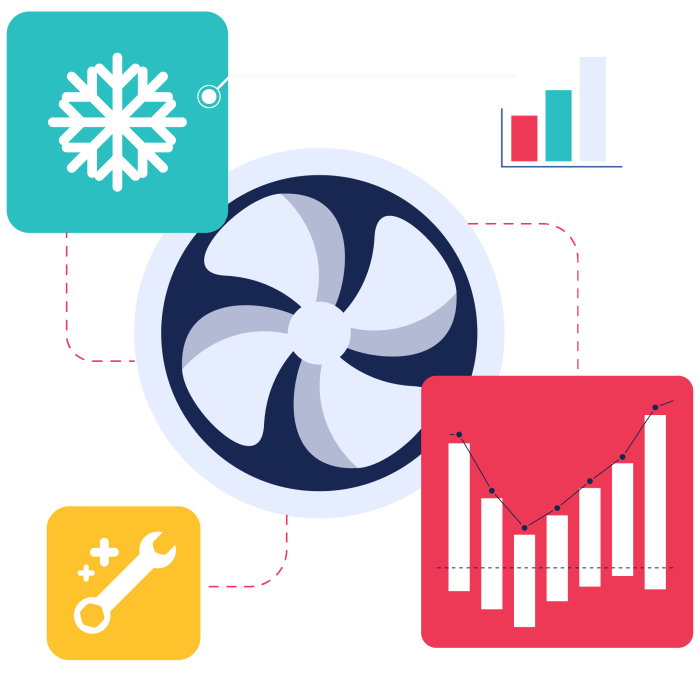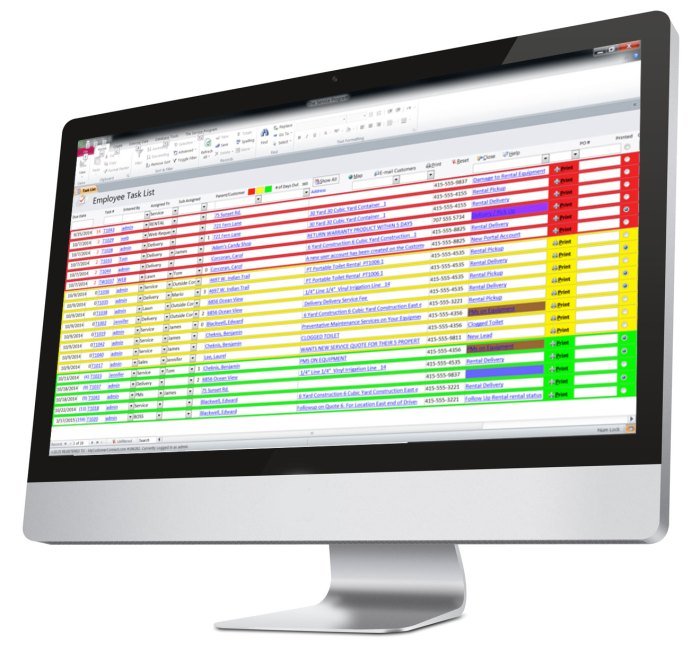In the dynamic realm of HVAC contracting, the adoption of specialized software has emerged as a game-changer, propelling businesses towards unparalleled efficiency, enhanced customer satisfaction, and increased profitability. This comprehensive guide delves into the intricate world of HVAC software, providing contractors with invaluable insights into its key features, benefits, selection criteria, implementation strategies, and best practices.
Embark on this journey to discover how HVAC software can revolutionize your operations and elevate your business to new heights.
The HVAC industry is constantly evolving, driven by technological advancements and changing customer demands. To stay competitive, contractors must embrace innovative solutions that streamline their workflows, improve communication, and optimize resource allocation. HVAC software serves as a powerful tool in this digital transformation, empowering contractors to navigate the complexities of their operations with greater ease and efficiency.
Market Overview
The HVAC software market for contractors is experiencing significant growth, driven by the increasing demand for energy efficiency and comfort in buildings. Key players in the market include industry giants such as Carrier, Trane, and Johnson Controls, as well as specialized software providers like ServiceTitan and FieldEdge.
The market size is estimated to reach USD 2.5 billion by 2027, with a projected growth rate of 6.5% over the next five years. This growth is attributed to the increasing adoption of smart building technologies, the need for improved operational efficiency, and the growing focus on sustainability.
Industry Trends
- Cloud-based solutions: Cloud-based HVAC software offers contractors greater flexibility, scalability, and access to real-time data.
- Mobile optimization: Mobile-friendly software enables contractors to manage their operations on the go, improving efficiency and customer satisfaction.
- Data analytics: HVAC software now provides robust data analytics capabilities, helping contractors identify trends, optimize performance, and make informed decisions.
Emerging Technologies
- Artificial intelligence (AI): AI-powered software can automate tasks, optimize energy consumption, and predict maintenance needs.
- Internet of Things (IoT): IoT-enabled devices allow contractors to remotely monitor and control HVAC systems, improving efficiency and reducing downtime.
- Virtual reality (VR): VR technology enables contractors to conduct virtual inspections and training, reducing the need for on-site visits.
Key Features and Functionality
HVAC software solutions offer a comprehensive suite of features and functionalities that streamline operations, enhance efficiency, and improve customer satisfaction for contractors.These features empower contractors to manage their entire business from a single platform, reducing administrative burdens and improving productivity.
Essential features include:
Job Management
- Centralized job scheduling and tracking
- Automated dispatching and routing of technicians
- Real-time visibility into job status and progress
- Mobile access for technicians in the field
Customer Management
- Comprehensive customer database with detailed profiles
- Automated appointment scheduling and reminders
- Service history tracking and maintenance reminders
- Online customer portals for self-service and communication
Inventory Management
- Real-time inventory tracking of parts and equipment
- Automated purchase orders and vendor management
- Mobile access for technicians to check stock levels and order parts on-site
Financial Management
- Integrated accounting and billing system
- Automated invoice generation and payment processing
- Comprehensive reporting and analytics for financial performance monitoring
Technician Management
- Technician scheduling and dispatching
- Real-time tracking of technician location and availability
- Performance monitoring and feedback mechanisms
- Mobile access for technicians to access schedules, job details, and customer information
Benefits of Using HVAC Software

HVAC software provides numerous advantages for contractors, streamlining their operations and enhancing their efficiency. These benefits include:
Increased Efficiency and Productivity
HVAC software automates tasks such as job scheduling, work order management, and inventory tracking. This reduces manual effort and eliminates errors, freeing up contractors to focus on more value-added activities.
Improved Job Management and Scheduling
HVAC software provides a centralized platform for managing jobs and scheduling technicians. Contractors can easily track the progress of each job, assign tasks, and optimize technician routes. This improves job visibility, reduces scheduling conflicts, and ensures timely completion.
Enhanced Customer Communication and Support
HVAC software allows contractors to communicate with customers effectively. They can send automated reminders, provide status updates, and resolve customer queries promptly. This enhances customer satisfaction and fosters long-term relationships.
Reduced Costs and Increased Profitability
HVAC software helps contractors reduce costs by optimizing their operations. It minimizes labor costs through efficient scheduling, reduces inventory waste through accurate tracking, and improves technician productivity. These savings translate into increased profitability for contractors.
Software Selection and Implementation
Selecting and implementing the right HVAC software is crucial for contractors to streamline their operations and improve efficiency. Here’s a comprehensive guide to help you navigate the process:
When evaluating different software solutions, consider the following factors:
Features and Functionality
- Core features such as job scheduling, dispatching, and invoicing.
- Specialized functions like equipment tracking, maintenance management, and customer relationship management (CRM).
- Integration capabilities with other business systems, such as accounting and CRM.
Cost and Licensing
- Software subscription fees and any additional costs for training or support.
- Licensing options and user limitations.
- Long-term cost-benefit analysis, considering potential return on investment (ROI).
Ease of Use and Support
- User-friendly interface and intuitive navigation.
- Availability of training and documentation.
- Responsiveness and quality of technical support.
Implementation Process
To ensure a successful implementation, follow these recommendations:
Project Planning
- Define project scope, goals, and timeline.
- Identify stakeholders and their roles.
- Establish communication channels and project management tools.
Data Migration and Training
- Transfer data from existing systems or manual processes.
- Provide comprehensive training to users on all aspects of the software.
- Offer ongoing support and assistance as needed.
Testing and Deployment
- Thoroughly test the software in a controlled environment.
- Gradually deploy the software across the organization.
- Monitor usage and collect feedback to identify areas for improvement.
Best Practices for Using HVAC Software

To maximize the benefits of HVAC software, it’s essential to adopt best practices. By following these guidelines, contractors can enhance efficiency, improve accuracy, and optimize system performance.
Effective use of HVAC software involves leveraging its comprehensive features, such as design, analysis, and reporting capabilities. These tools empower contractors to create accurate designs, conduct thorough system analysis, and generate detailed reports that meet industry standards.
Data Management
Maintaining accurate and organized data is crucial. Regularly update equipment information, system parameters, and project details to ensure the software provides reliable results. Implement a systematic approach to data entry and storage to minimize errors and maintain data integrity.
Software Updates
Regularly check for software updates to access the latest features, bug fixes, and performance enhancements. By staying up-to-date, contractors can ensure their software operates at optimal levels and incorporates the most recent industry advancements.
Training and Support
Invest in training to fully understand the software’s capabilities and maximize its potential. Utilize available resources, such as user manuals, online tutorials, and vendor support, to enhance proficiency and troubleshoot any issues.
Collaboration and Communication
Encourage collaboration among team members by sharing project files and utilizing the software’s communication features. This facilitates effective knowledge sharing, reduces errors, and ensures everyone is on the same page.
Continuous Improvement
Regularly evaluate software usage and identify areas for improvement. Seek feedback from users and explore additional features or integrations that can enhance productivity and streamline workflows.
Final Conclusion
In conclusion, HVAC software is an indispensable asset for contractors seeking to enhance their operations, elevate customer satisfaction, and maximize profitability. By carefully selecting and implementing the right software solution, contractors can unlock a world of possibilities, transforming their businesses into well-oiled machines that deliver exceptional results.
Embrace the power of technology and witness the transformative impact HVAC software can have on your contracting enterprise.
FAQ
What are the key features of HVAC software for contractors?
HVAC software typically includes features such as job management, scheduling, invoicing, inventory tracking, customer relationship management (CRM), and reporting.
How can HVAC software improve efficiency and productivity?
HVAC software can automate tasks, streamline communication, and provide real-time data, which can help contractors save time and improve their overall efficiency.
What are the benefits of using HVAC software for customer communication and support?
HVAC software can help contractors track customer interactions, manage service requests, and provide timely updates, which can improve customer satisfaction and loyalty.
How can HVAC software help contractors reduce costs and increase profitability?
HVAC software can help contractors optimize their operations, reduce waste, and improve their overall profitability.
What factors should contractors consider when selecting HVAC software?
Contractors should consider their specific needs, the size of their business, their budget, and the features and functionality of the software when selecting HVAC software.